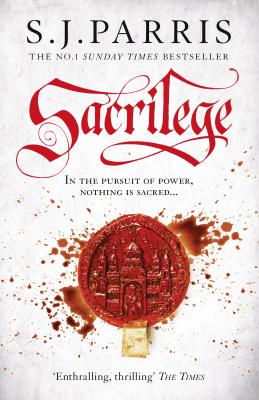Sacrilege. S. J. Parris
Читать онлайн.| Название | Sacrilege |
|---|---|
| Автор произведения | S. J. Parris |
| Жанр | Исторические детективы |
| Серия | Giordano Bruno |
| Издательство | Исторические детективы |
| Год выпуска | 0 |
| isbn | 9780007317790 |
Harper
An imprint of HarperCollinsPublishers
1 London Bridge Street
London SE1 9GF
First published in Great Britain by HarperCollinsPublishers 2012
Copyright © Stephanie Merritt 2012
Cover photographs © Angelo Hornack/Alamy [seal]; Shutterstock [blood]
Stephanie Merritt asserts the moral right to be identified as the author of this work
Excerpt from Giordano Bruno novel four © Stephanie Merritt 2012
A catalogue record for this book is available from the British Library
This novel is entirely a work of fiction.
The names, characters and incidents portrayed in it are the work of the author’s imagination. Any resemblance to actual persons, living or dead, events or localities is entirely coincidental.
All rights reserved under International and Pan-American Copyright Conventions. By payment of the required fees, you have been granted the non-exclusive, non-transferable right to access and read the text of this ebook on-screen. No part of this text may be reproduced, transmitted, downloaded, decompiled, reverse engineered, or stored in or introduced into any information storage and retrieval system, in any form or by any means, whether electronic or mechanical, now known or hereinafter invented, without the express written permission of HarperCollins.
EPub Edition © April 2012 ISBN: 9780007317790
Version: 2019-10-11
Contents
I knew that I was being followed long before I saw or heard my pursuer. I felt it by some instinct that by now had been sharpened by experience; a shifting of the air, a presence whose movements invisibly shadowed my own. Someone was watching me and had been for several days: from the mouths of alleyways, from behind pillars or walls, amid the crowds of people, carts and animals that thronged the narrow streets of London or out among the river traffic. At times I even sensed eyes on me in the privacy of my room at Salisbury Court, though that was surely impossible and could only have been the tricks of imagination.
It was the twenty-third day of July, 1584, and I was hurrying to deliver my new book to my printer before he left London for the rest of the summer. A merchant ship from Portugal had recently docked at Tilbury, at the mouth of the River Thames. Plague was raging in Lisbon and the crew had been forcibly quarantined; despite these measures, rumours that the infection had begun to claim English victims were spreading through the city quicker than the disease itself ever could. Outbreaks of plague were common enough during London summers, I had been told, and any Londoner with the means to move to healthier air was packing as fast as they could. At the French embassy, where I lived as the Ambassador’s house-guest, whispers of the black plague had sent the household into such a frenzy of imagined symptoms that the Ambassador had dispatched his private secretary to enquire about country houses in the neighbourhood of the Palace of Nonsuch, Queen Elizabeth of England’s summer residence.
Fear of the plague had only added to tensions at the embassy in the past few days. Our peace had been shattered the previous week by the arrival of the news from the Netherlands that William the Silent, Prince of Orange, had been assassinated, shot in the chest on the staircase of his own house in Delft by a man he knew and trusted. I imagined that in all
